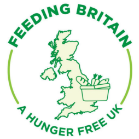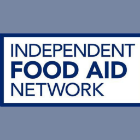4 ‘Food Poverty’ myths that you didn’t know needed busting
October 11, 2022
Today is the 30th anniversary of the United Nations' #InternationalDayfortheEradicationofPoverty. The theme for 2022 is Dignity. One of our main principles at Sufra is to uphold and enhance the dignity of our guests. It's not enough to provide food aid - we aim to empower our guests, improve their wellbeing and reduce their dependency on food aid. Considering that poverty is multidimensional (and experienced by 1.3 billion people worldwide), we wanted to debunk some thoughts people might have about food poverty and those experiencing it.
Myth #1
'The solution to food poverty is to provide those in need with food.'
Wrong.
Sure, in the very immediate term, if someone in crisis cannot afford to buy food then providing a food parcel provides vital immediate support. However, what happens the week after that? And the week after that?
In order to support those experiencing food insecurity, we need to address the reasons why they are in poverty. These are often unrelated to food, and relate to issues with the welfare benefit system, unaffordable housing, lack of stable living-wage jobs, the hostile immigration system and of course the spiraling cost of living.
Food poverty isn’t a lack of access to food, it is simply poverty.
Myth #2
'There is too much food waste! This is why some people don’t have enough food.'
Wrong.
The shocking amounts of ‘surplus’ waste produced by large retailers up and down the country is a scandal. This is an issue in its own right, related to overstocked supermarkets, warped food standards and other things. The fact that sourcing ‘surplus’ food has become such a key part of the ‘food aid’ infrastructure is problematic. It’s not dignified for anyone to rely on ‘waste’ food to survive.
Food poverty isn’t caused by excess food waste, it is simply poverty.
Myth #3
'Distributing food to those in need is better than them having the money they need to buy it themselves, because you don’t know what people will spend it on.'
Wrong.
We are advocating for a society where everyone can access enough income to live comfortably, including purchasing the basic items they need, when they need them.
In the last 10 years at Sufra, we have seen how transformative the Cash First approach can be. Available emergency grants allow families to cover unexpected large costs, applications to extra benefits ensure individuals can cover core costs, and most importantly, fair and steady wages allow families and individuals to live comfortably.
Food poverty isn’t a consequence of not spending money wisely, it is simply poverty.
Myth #4
Buying reduced and ‘basic range’ items will ensure you can make your budget work.
Wrong.
What this myth fails to recognise is that poverty is often a barrier to shopping more efficiently. Travelling between multiple supermarkets to find the best deals and create menus based on a random array of reduced items costs money and takes time. Many people live in ‘food deserts’ and don’t have much choice about where they can shop. ‘Basic’ ranges are often limited, and do not create entire nutritionally balanced meals without other ingredients. This is before allergies, dietary requirements and preference is even taken into account.
Food poverty can’t be solved by shopping differently, it is simply poverty.
Read more about International Day of Eradicating Poverty here:
[maxbutton id="6" url="https://www.un.org/en/observances/day-for-eradicating-poverty" text="Learn more!" ]
Latest News












